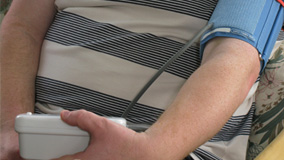STRESS

Feeling stressed?
If the answer is yes, you're not alone. Stress is the feeling of being under too much mental or emotional pressure, and pressure turns into stress when you feel unable to cope.
A bit of stress is normal and can help push you to do something new or difficult, but too much stress can take its toll.
Stress and you
Lots of things can cause stress, including work, relationships and money problems. Stress can affect how you feel, think, behave and how your body works – from how well you sleep to your immune system.
In the short-term that's not really a bad thing, but long-term stress puts your health at risk.

Your body
Stress is not an illness itself, but if it isn't under control it can cause serious illnesses, such as heart disease, asthma, stroke, diabetes and some types of cancer. Spotting the early signs of stress, like sweating, loss of appetite, headaches and loss of concentration will help prevent it getting worse.

Your mind
If you are stressed you may feel worried, anxious, irritable or have low self-esteem. You may also notice that you lose your temper more easily, drink more or act unreasonably.

Stress and sleep
Your mood and how well you sleep affect each other. Feeling stressed can mean you don't sleep well enough, and if you don't sleep well enough this may make you feel more stressed.
Why you should stress less
When stress becomes too much you might feel you can't cope or are worried, fearful and anxious. It can affect how you live your life. It can stop you doing things you enjoy and keep you awake at night. So, there are lots of reasons to try to stress less.

Feel happier
Reducing your stress levels and feeling more in control boosts your mood and means you are more able to cope with life's ups and downs.

Help your health
Stress can take its toll on your body and your immune system. Getting stress under control can boost your immune system and help prevent serious health problems, such as high blood pressure and heart disease.

Build positive relationships
Stress can affect how you feel and how you react to people. Learning how to manage stress can help you build and maintain positive relationships with your family and those around you. Managing stress in a healthy way also helps teach your loved ones how to cope with stress in the future.
How to stress less
There's no quick-fix cure for stress, but there are simple things you can do to help you stress less. These include relaxing, exercise, eating a healthy and balanced diet, and talking to someone.
Remember, you don't have to suffer alone and a good place to start is to talk to your GP.

Help yourself
Take simple steps to make yourself feel less stressed. Make time for fun and relaxation, and try to do something you enjoy every day. Find a way of being active that you like. Being physically active releases feelgood hormones called endorphins and can help you to sleep better – helping to lower stress levels.

Talk to someone
If you're feeling too stressed, talking to someone can really help. You could start by telling your GP about how you feel. They'll be able to help you start to get help. Ask about free Cognitive Behavioural Therapy (CBT), a talking-based treatment for people who need help with managing their difficult feelings.

Take control of worries
Do you have problems winding down and find yourself worrying non-stop when you get into bed? Many people find that their worries stem from concerns about money. You can get free advice on managing debt problems from the charity Step Change. You can also check out these other ways to help you deal with everyday stresses.
Other Health Information
Are you feeling tired?
The odd bad night's sleep won’t harm your health. But, regular poor quality sleep can put you at risk of serious medical conditions and can affect body, thoughts, emotions and behaviour.
Follow One You